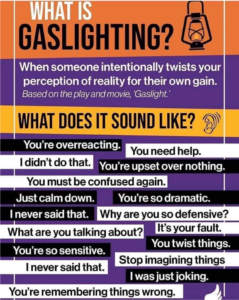
Increasingly in my practice as well as in the world outside the office, I have become more and more aware of women, some men too, in toxic relationships. I am thankful for the shelters and agencies that exist in our area that stand ready to help women and children especially (see list at end of article). I am thankful to be part of an amazing team at Groff and Associates who is ready to support those aware of their need for change, support, and healing. Recently, I attended a workshop with the above title given by Dr. Janie Lacy, LMHC, NCC, CSAT with Life Solutions. Lacy states, “Toxic Relationships are built on 3 C’s:”
- Conflict
- Competition
- Control
I found the information very helpful and combined highlights from it with some of my insights from doing therapy across the years. If you read this and find it pertains to yourself or someone you know, you may choose to get or offer support. Don’t delay. You might save a life. It may be yours.
Dr. Lillian Glass in her book “Toxic People” defines a toxic relationship as “a relationship between two people who don’t support each other, where there’s conflict and one seek to undermine the other, where there’s competition, where there’s disrespect and a lack of cohesiveness.”
A toxic relationship feels overwhelming and exhausting to the point that the bad parts of the relationship far outweigh the good. The very atmosphere of any mutual living space feels heavy and oppressive. People in a toxic relationship often feel trapped and come to believe they deserve such mistreatment. Toxic relationships are mentally, emotionally, spiritually, and sometimes physically damaging to one, both, or all who are in the relationship. Toxic relationships affect others outside the couple too such as children, extended family members, friends, and work.
Glass sites the following as common signs of a Toxic Relationship:
- Isolation – The victim is progressively isolated from friends, family and other caring persons.
- Ongoing arguments
- Blaming – Anger is displaced and the victim is blamed.
- Jealousy and dishonesty – Trust is absent.
- Denial and Gaslighting – The victim constantly denies reality and says only what they think their partner wants to hear. See below for description of “gaslighting.”
- Giving in on everything- The victim’s feelings, wants, and thoughts are denied by themselves for the sake of “peace.” They lose their voice.
What is gaslighting
The term “gaslighting” comes from the 1938 play and 1944 movie, “Gaslight,” in which a young woman is quickly swept off her feet by a charming man, Gregory. After marriage, the couple moves into a mansion Paula inherited from her aunt. However, tragic memories are triggered because when Paula was a young girl, she witnessed the murder of her aunt in the mansion. Gregory, for motives revealed as the story continues, begins to slowly over time take advantage of Paula and deceptively manipulates her by telling her she is acting “irregularly,” she is “fitful,” and “forgetful.” He convinces her she is mentally ill and should not leave the house or interact with others. Thus, isolating her by telling others she is “not well.” He also tells her she is imagining things when she hears strange knocking sounds and the gaslights in the house dim and brighten seemingly by themselves. Gregory lies and constantly abusively puts Paula down as she begins to believe he is right and that she is worthless, weak, and crazy. She gives into him on everything and eventually loses herself and falls apart.
The term “gaslighting” means “When a person lies for their own gain to another person so repeatedly and with so much confidence that the victim begins to doubt her own sanity. The victim, becomes uncertain that she can perceive reality correctly, and becomes dependent on the gaslighter, more attached to him than ever” (What is Gaslighting).

How and why would anyone become involved in such a relationship? Below are some of the reasons, any one of which might make a person vulnerable to a victimizer.
Different Reasons People Attract Toxic Relationships
- Lack of good personal boundaries or unable to honor your own boundaries
- Unconscious or unaware of how your past impacts your present
- Parent lacked boundaries which you normalized and repeat today
- People pleaser seeking validation and approval.
- Parent or caregiver was an addict, narcissist, and/or alcoholic
- You are loyal to everyone but yourself.
- Emotional, physical, sexual abuse/neglect in your past – perhaps in the family or perhaps outside the family by adults or peers; bullied as a child or teen.
- Low self-worth*
- Low self-care*
- Low self-compassion*
- Reactive when triggered or disappointed (makes you easy to control)
*See: “The Mother Hunger,” and “Ready to Heal,” by Kelly Daniels.
With counseling and therapeutic and spiritual support one can heal from a toxic relationship. Your mindset can shift from VICTIM to VICTOR! This will require:
- COMMITMENT to the healing journey with its ups and downs
- BEING clear on your INTENTION AND DECISION TO HEAL- remembering why you decided to heal and target that reason helps you continue to aim for the goal of healing.
What does it look like to HEAL and be in GOOD, HEALTHY relationships
- Know and practice good SELF CARE and know it is not selfish
- Have increased self-confidence
- Declutter straggler relationships
- Develop the best version of yourself that includes enjoying healthy choices
Though this article is brief and is just a beginning to addressing this issue, know there IS HOPE and there is HEALING!
Groff and Associates: 317-474-6448; 7425 E. 86th St; Indianapolis, IN 46256
Prevail of Central Indiana: 317-773-6942; 1100 S. 9th St; Noblesville, IN 46060
Domestic Violence Network: 317-872-1086; 9245 N. Meridian #235; Indianapolis, IN 46260
Ruth Lilly Women and Children’s Center: 317-637-5551; Salvation Army Shelter- 540 N. Alabama; Indianapolis, IN 46204
Wheller Mission Center for Women and Children’s Shelter: 317-687-3630; 3208 E. Michigan; Indianapolis, IN 46204
Hands of Hope Hot Line: 765-664-0701
“What is Gaslighting,” Online workshop by Dr Janie Lacey LMHC, NCC, CSAT-S of Life Counseling Solutions. August 6, 2021
